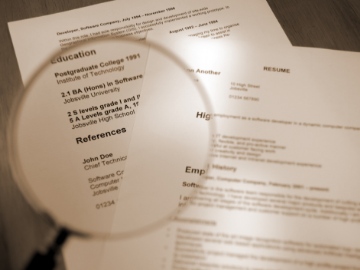What Should You Always Put on a Job Application

Employers use job applications to compare and narrow in on acceptable candidates. They use them to weed out specific requirements and skills or to ask explicit job-related questions. Job applications are a vital part of your job search. Completing them thoroughly can be the key to landing you a job. Many companies require you to fill out a job application even if you upload your resume.
What is a Job Application
Job applications are the online, paper, or in-person forms you fill out when you apply for a job. This is how you make your first impression. They require essential details such as your credentials, citizen status for tax purposes, and contact information. They then ask for job-specific information including work history, education, competency questions, and a personal statement.
The forms are used to gain information directly related to the position you're applying for. Sometimes, employers won't even look at your resume if your job application doesn't tick their boxes. They can simply scan the document looking for certain keywords regarding education or work history, speeding up the recruitment time. These are automated tools that judge candidates.
How to Fill Out a Job Application
Job applications will vary depending on the company. Make sure you fill in ALL the boxes. Don't leave anything blank as it will come across as lazy or worse. Even if a question doesn't apply to you, write N/A to show you acknowledged it. Give detailed responses - use the job application to sell yourself. A job application is a great opportunity to emphasize things that might not be covered on your resume.
Most of your education and work history information will be the same on the job application as on your resume. This includes dates of employment, job titles, and other administrative aspects. The information must correlate.
Do not exaggerate or lie as this will only come back to haunt you later. But you can use the application as an opportunity to expand on what your resume says. What is different from your resume are the competency questions and personal statements required on a job application.
Employers will use a set of competency-based questions to acquire further details about a candidate. Anyone can talk themselves up on a resume. The way these questions are answered provides a clearer image of the applicant. Here are some example questions you could encounter:
- Describe a situation where you've worked in a team and what role you played.
- Describe a time when you weren't confident with a task and how you overcame it.
These details will help recruiters decide whether you're fit for the role. They also demonstrate how you would fit into the company dynamic.
The job application may then require a personal statement. This will provide the employer with the final touch when painting a picture of the applicant. Much like a cover letter, the personal statement allows applicants to explain on more of an interests and values basis how they are suitable for the position.
How to Make Your Application Stand Out
You cannot exaggerate your education and experience, but how you answer the other sections on a job application can help you stand out. Therefore, you should tailor each of your responses to the company you're applying for. Generic responses won't impress anyone and your time will be wasted.
Unless given a limit, answer job application questions with plenty of detail. Be concise but informative. Take this question: Describe a situation where you've worked in a team and what role you played. This is the perfect opportunity to show an employer how you have transferable skills in communication and problem-solving. Thread skills and personality traits into your responses.
Your personal statement is your sales pitch. Take your time writing this. Research the company values and vision and align them with your own. If a company values sustainability, demonstrate how you practice sustainability and what drives you to do so. If you have a strong interest but not the required qualifications, explain how you plan on improving your skills. Discuss long-term career goals and how they could contribute to company growth.
In Summary
As with any professional commitment, check for errors before submitting your job application. There are plenty of free tools, including Microsoft Word Editor and Grammarly. Review your application before submission to ensure you've filled in all the boxes. Most importantly, take pride and care in your application to truly demonstrate why you're the one to hire.


